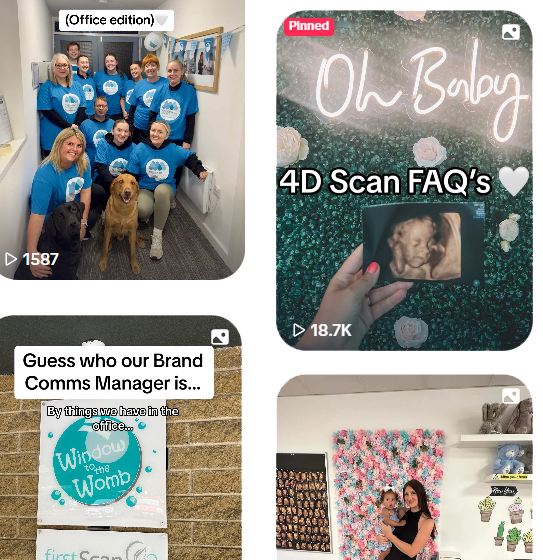Pregnancy is often portrayed as a time of cravings, glowing skin, and hearty appetites- but the reality is often far more complex. For many expectant mothers, one of the earliest and most frustrating symptoms is a loss of appetite.
If you’re finding it hard to eat the way you used to – or can barely face food at all – you’re not alone. Appetite loss during pregnancy is surprisingly common, particularly in the first trimester, and it can be caused by a range of physical and emotional factors. The good news is, in most cases it’s temporary, and there are things you can do to help manage it.
In this blog, we’ll explore:
- Why appetite loss happens
- When to worry
- Tips to stay nourished even with a reduced appetite
- Support and resources available in the UK
Why Does Appetite Loss Happen During Pregnancy?
Your body goes through extraordinary hormonal and physical changes during pregnancy, especially in the first 12 weeks. It’s no surprise that your relationship with food might change as a result. Some common causes of appetite loss include:
1. Morning Sickness and Nausea
This affects up to 8 out of 10 women in early pregnancy, and it’s one of the main culprits behind a reduced appetite. Nausea (which can happen any time of day) may be triggered by strong smells, certain foods, or even just hunger itself.
2. Hormonal Changes
Rising levels of human chorionic gonadotropin (hCG) and progesterone are essential for supporting your pregnancy, but they can also affect your digestive system, slowing it down and making you feel full more quickly.
3. Food Aversions
Suddenly can’t stand the smell of your favourite meal? You’re not imagining it. Pregnancy heightens your sense of smell and taste, making previously enjoyable foods seem unbearable.
4. Fatigue and Emotional Stress
The emotional rollercoaster of early pregnancy, combined with exhaustion, can dull your interest in food. Anxiety, fear about the pregnancy, or body changes can also impact appetite.
5. Bloating, Indigestion and Constipation
As the pregnancy progresses, digestive issues can make eating less appealing. Feeling uncomfortably full or bloated can reduce the desire to eat.
Is It Normal to Lose Your Appetite?
Yes – in many cases, it’s entirely normal. Appetite loss is particularly common in the first trimester, when your body is adjusting to the surge of pregnancy hormones. For most women, this eases by the second trimester, when nausea fades and energy levels improve.
That said, any significant or prolonged loss of appetite should be discussed with a midwife or GP, especially if:
- You’re struggling to keep any food or liquids down
- You’ve lost weight during pregnancy
- You feel faint, dizzy, or dehydrated
- Your appetite doesn’t improve by the second trimester
Persistent appetite loss can be a sign of hyperemesis gravidarum (HG) – a serious condition that goes beyond morning sickness and may require medical treatment.
Tips to Cope with Appetite Loss During Pregnancy
While you may not feel like eating much, your body and your baby still need fuel. Here are some gentle, realistic ways to support your nutrition even when your appetite is low:
1. Eat Small, Frequent Meals
Try eating something light every 2–3 hours, rather than forcing yourself to eat three full meals. Snacking can help keep nausea at bay and prevent low blood sugar.
2. Focus on Easy-to-Digest Foods
Plain or bland foods like:
- Dry toast
- Crackers
- Bananas
- Applesauce
- Mashed potatoes
can be more palatable when you’re feeling queasy.
3. Try Cold or Room-Temperature Meals
Hot foods often have stronger smells, which can be off-putting. Cold meals – like sandwiches, salads, or overnight oats—may be easier to tolerate.
4. Stay Hydrated
Drink small sips of water, diluted squash, herbal teas, or electrolyte drinks throughout the day. Dehydration can worsen nausea and fatigue. If plain water makes you feel sick, try sparkling water with lemon or ginger.
5. Incorporate Nutrient-Dense Snacks
Even small portions can be nutritious. Consider:
- Smoothies with yoghurt, fruit, and oats
- Wholegrain toast with nut butter
- Hard-boiled eggs
- Cheese and wholegrain crackers
- Greek yoghurt with berries
6. Experiment with Ginger and Peppermint
Ginger (tea, capsules, or biscuits) and peppermint (tea or lozenges) are both known to help reduce nausea. Many pregnant women swear by them.
7. Rest and Reduce Stress
Fatigue and stress contribute significantly to appetite loss. Aim for quality rest, ask for help where you can, and don’t hesitate to slow down.
8. Consider Prenatal Vitamins
If you’re struggling to eat well, a pregnancy multivitamin can help ensure you’re still getting essential nutrients like folic acid and iron. Always speak to your GP or midwife before starting new supplements.
When to Seek Medical Help
While appetite loss on its own isn’t usually dangerous, you should contact your GP, midwife, or local maternity unit if:
- You’re unable to eat or drink for more than 24–48 hours
- You’ve lost a noticeable amount of weight
- You feel constantly nauseated, weak, or faint
- Your appetite doesn’t return at all by the second trimester
You may need support for conditions like:
- Hyperemesis gravidarum (HG)
- Anaemia
- Nutritional deficiencies
There are safe treatments available, including anti-nausea medication, so you don’t have to suffer in silence.
Support and Resources in the UK
Here are some trusted UK-based sources offering guidance, information, and emotional support:
- NHS Pregnancy Guide
Advice on symptoms, nutrition, and when to seek help:
🔗 https://www.nhs.uk/pregnancy - Tommy’s: Pregnancy Symptom Checker – Appetite Loss
Reassurance and tips from a pregnancy charity:
🔗 https://www.tommys.org - Pregnancy Sickness Support UK
A brilliant organisation supporting those with severe nausea and HG:
🔗 https://www.pregnancysicknesssupport.org.uk/ - Hyperemesis Education and Research (HER) Foundation
International, but with plenty of useful resources and forums:
🔗 https://www.hyperemesis.org/ - Start4Life – Healthy Eating in Pregnancy
Practical advice from the NHS on what to eat and avoid:
🔗 https://www.nhs.uk/start4life/pregnancy/healthy-eating-pregnancy
Final Words: Be Gentle With Yourself
Pregnancy isn’t a straight line – and appetite loss is one of the many bumps along the way. Try not to feel guilty or worried if you’re eating less than usual. Your body is working incredibly hard behind the scenes, and appetite fluctuations are a normal part of that process.
Focus on doing what you can. Nourish yourself in small, manageable ways, rest when you need to, and talk to your healthcare provider if things feel overwhelming. Most importantly, know that this will pass – and there’s support if you need it.













 Packages & Prices
Packages & Prices  Important Info & Policies
Important Info & Policies  Your Scan
Your Scan